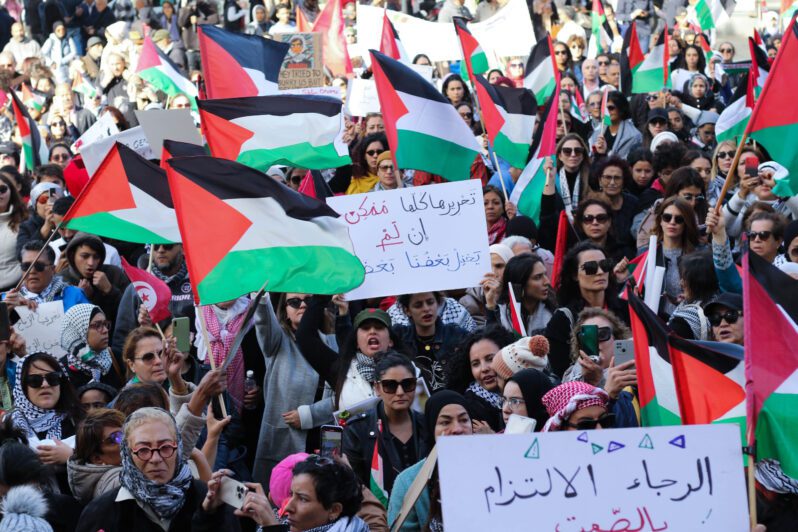Main Arab Legal Events: The Legal Agenda’s Perspective: Weekly Note noo 14 (3-10 December 2012)

Main Arab Legal Events: The Legal Agenda’s Perspective
Weekly Note noo 14 (3-10 December 2012)
Egypt: Will Judges Supervise the Referendum after President Morsi Revoked the Constitutional Declaration?
Tunisia: Judges’ Salary Raise
Jordan: Ongoing Protests against the State Security Court
Movements within Judicial Entities in Yemen and Morocco towards the Promotion of Women’s Status
1- Egypt:
-Amid growing political, judicial and population pressures that have particularly translated into street tensions and clashes’ intensification, the President of the Egyptian Republic issued a new constitutional declaration abolishing the former one (that he promulgated on 21-11-2012, thus leading to the outbreak of a large-scale political, legal and judicial crisis). However, the new declaration preserved some articles of the original one and kept the constitutional referendum date unchanged. It provided for the reinvestigation into the revolution-related crimes if new evidence becomes available.
-In the wake of the new constitutional declaration, a number of judges and General Prosecution members (notably the State Council Judges’ Club) took back their decision to boycott the referendum. The Egyptian Judges’ Club President had previously declared that 2039 judges would boycott “the referendum” and 227 others would take part in it. He had accused the Supreme Judicial Council of “igniting a schism between judges”.
-Lawsuits were filed by more than 25 right groups and others seeking the annulment of the constitutional declaration: the Muslim Brotherhood’s lawyers requested a new judges’ panel mainly due to previous positions of the State Council Judges’ Club regarding articles of the constitutional declaration, as well as former Council’s decisions as to the constitutionality of the constituent assembly. When the lawyers withdrew the appeals they filed to dismiss the judges, the administrative court fined the Muslim Brotherhood LE1.47 million (1470000).
-The Supreme Constitutional Court remains besieged (by President Mohammad Morsi’s supporters denouncing its members and calling upon the dissolution of the constituent assembly and the Shura Council). The court is still suspending its work until further notice, while denying rumors spread by the media about a meeting it held to “oust” president Morsi, for incompetence of the court in the first place.
2- Tunisia:
-The Justice Ministry submitted to the Prime Minister a draft order to raise judges’ salaries, and a new chapter of confrontations between the Tunisian Judges’ Association and the executive authority opened up after the association had been excluded from taking part in the Cartaj celebrations of the International Human Rights Day to honor the Tunisian organizations’ struggle in times of tyranny.
3- Jordan:
-Marches requesting the abolition of the State Security Court and “the lifting of martial laws” continue to take place in Jordan. Meanwhile, following the release by the State Security Court of two young men who had recently participated in protests, royal directions providing for the release of the movement’s detainees within 48 hours have been declared. It should be noted that parents of detainees have threatened to go on an open hunger strike.
4- Morocco and Yemen:
The Moroccan Judges’ Club launched the “Woman Judge” award for the year 2013. On another note, The Yemeni Supreme Judicial Council is looking into the elaboration of a legal structure that would guarantee a real participation for Yemeni women in the public sphere and put them on an equal footing with men in all aspects of life.
Beyond the Weekly Note: Ongoing Crackdown on the Freedom of Speech
– The Sultanate of Oman:
-Arbitrary judgments repressing the freedom of speech continue to wreak havoc as the court of appeal supports the verdicts issued by the first instance court condemning six activists to one year imprisonment on charges of “insulting the Sultan” on the “Facebook” online social network and “Twitter”. The Arab Network for Human Rights Information condemned the aforementioned unfair judgments.
-United Arab Emirates:
– Human Rights partisans and detainees at the State Security Court continue to suffer from repressions, last of which was the arrest of one of the activists on “Twitter” on unclear charges. In this regard, the Arab Network for Human Rights Information denounced the excessive repressions of opposition detainees.
Prepared by Christelle El-Feghaly



